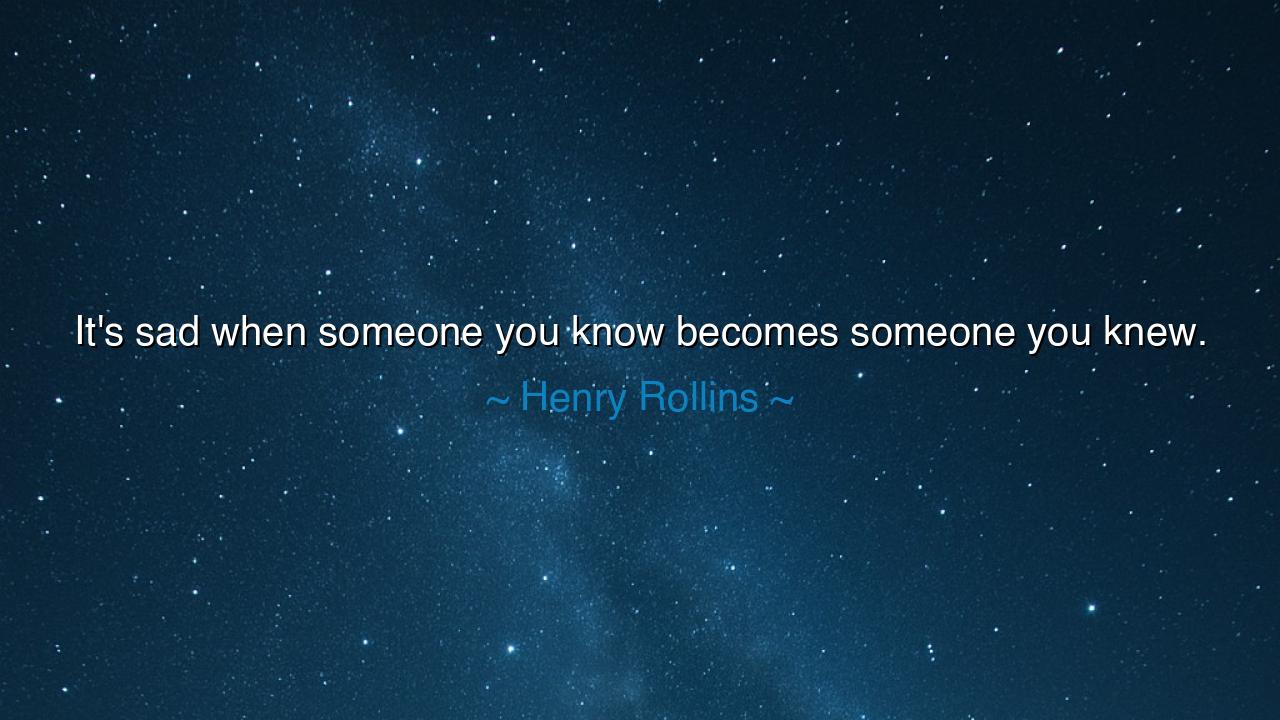
It's sad when someone you know becomes someone you knew.






The words of Henry Rollins, “It’s sad when someone you know becomes someone you knew,” carry the quiet weight of a thousand unspoken farewells. Beneath their simplicity lies the ancient ache of impermanence, the truth that every bond we hold—be it love, friendship, or kinship—is fragile before the relentless march of time. This quote speaks to the transformation of the living present into the distant past, of shared laughter into silence, of the heartbeat beside us into an echo. It is not death alone that severs connection; sometimes it is distance, pride, or the slow erosion of understanding that turns someone we know into someone we once knew.
From the dawn of humanity, poets have wrestled with the sorrow of change. The Greeks called it ananke—the necessity that all things must alter, fade, and move beyond our grasp. Rollins, a man who has seen the raw edge of both art and loss, reminds us that even the strongest human bonds are subject to this law. When he says it is “sad,” it is not the bitterness of regret he speaks of, but the mourning of what once was whole and now lives only in memory. To know someone deeply, and then find them unreachable—by time, by circumstance, by the shifting currents of life—is to taste a small death of the heart.
Consider the story of Cicero and Julius Caesar, two great men of Rome. Once companions and allies, bound by the shared dream of restoring the Republic’s glory, they became strangers through the tides of ambition and betrayal. Cicero, once the confidant of power, became its critic; Caesar, once a friend, became a force he could no longer recognize. When Cicero later reflected on their broken bond, he wrote of the sorrow that comes when familiar faces become foreign, when a friend’s voice no longer calls you brother. It is the same sadness Rollins describes—the grief of recognition lost.
But there is also something deeply human in this pain. It reminds us that love, friendship, and connection are not possessions—they are living forces that must be tended. When we neglect them, when pride replaces compassion, when silence replaces honesty, the bridge between souls begins to crumble. Over time, those who once shared the same road diverge into separate paths. The warmth of their memory remains, but it becomes a ghost—something beautiful, yet untouchable. To Rollins, this sadness is not weakness; it is the price of truly having cared.
In another age, the philosopher Heraclitus said, “You cannot step into the same river twice.” For both the river and the man have changed. So it is with people. The friend you once knew is not the same as the one who stands before you now, and neither are you. Some changes bring growth and rebirth, others bring distance and loss—but all remind us that life flows, and we must learn to let the current carry what cannot be held. The sadness Rollins speaks of is the quiet wisdom of accepting that even the dearest faces can fade into memory, yet the love shared still shapes who we are.
Yet within this sorrow lies a call to action—a reminder to cherish the present. Speak the words of gratitude now, offer forgiveness while hearts still listen, and honor the people who walk beside you before they become shadows in the corridors of the past. Do not let neglect turn love into remembrance. For every “someone you knew” was once “someone you cherished,” and it is in cherishing that we fulfill our human duty to the heart.
The lesson is clear: relationships are living gardens that must be watered with attention, honesty, and kindness. When we lose someone—whether through time, pride, or death—we must not let grief harden us. Instead, let it remind us to love more fiercely those who remain. The sadness Rollins describes will visit every soul, for no one escapes the transformations of life. But through remembrance, compassion, and courage, we can turn that sadness into wisdom. In the end, the truest way to honor someone you knew is to live with the same depth of heart that once made their presence so precious.






AAdministratorAdministrator
Welcome, honored guests. Please leave a comment, we will respond soon